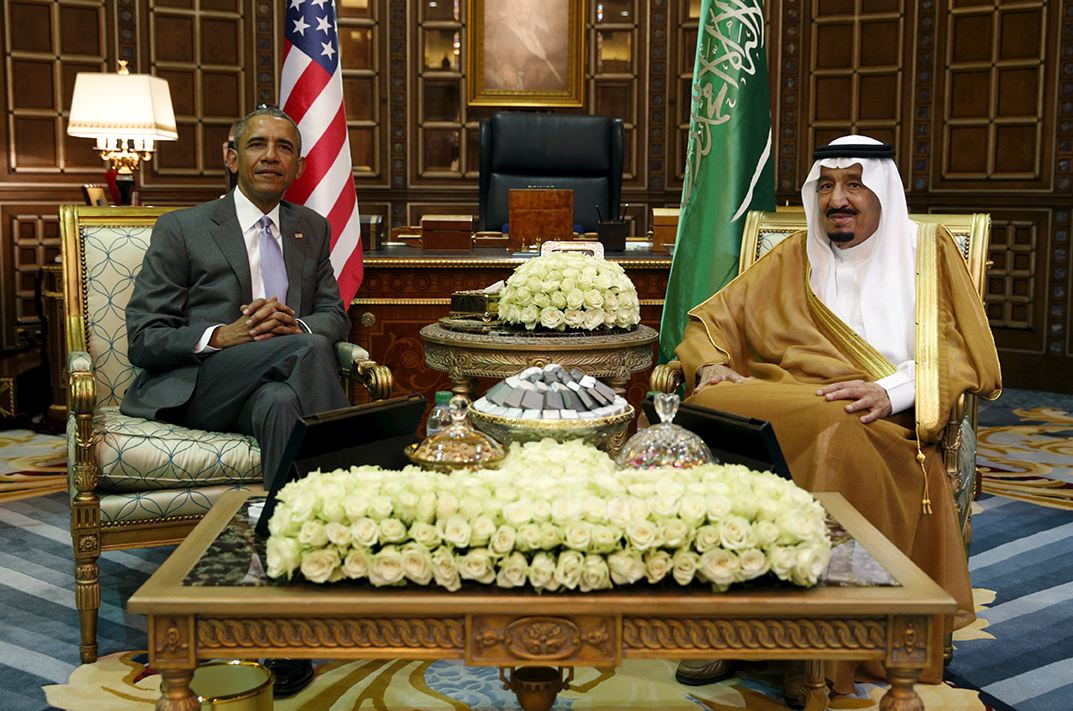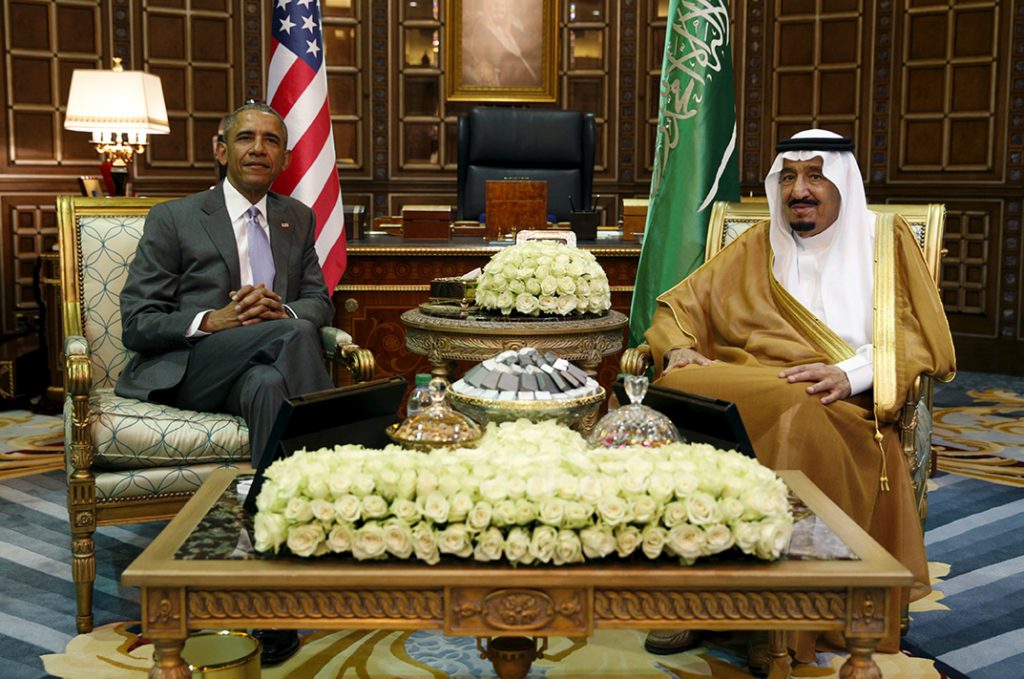 The hallowed US-Gulf bargain of “oil for security” is past its sell-by date; the future of the US-Gulf relationship is up for grabs. It has always been a fraught relationship. Right from the outset, the United States never kept its promise to consult with the Saudis before recognizing Israel. Since 9/11, the relationship has grown much rockier—with many Americans blaming the Kingdom for the attack. From the perspective of the Gulf Cooperation Council (GCC), the United States went ahead and invaded Iraq in 2003, upsetting the delicate Sunni-Shia balance. Adding insult to injury, Washington further enhanced Iran’s position with the nuclear agreement, which was concluded last summer. The coup de grace was the United States’ development of shale oil and gas that is likely to cap the selling price of Saudi and GCC oil for the next decade or two—gone are the heady days of $90-$100 per barrel oil.
The hallowed US-Gulf bargain of “oil for security” is past its sell-by date; the future of the US-Gulf relationship is up for grabs. It has always been a fraught relationship. Right from the outset, the United States never kept its promise to consult with the Saudis before recognizing Israel. Since 9/11, the relationship has grown much rockier—with many Americans blaming the Kingdom for the attack. From the perspective of the Gulf Cooperation Council (GCC), the United States went ahead and invaded Iraq in 2003, upsetting the delicate Sunni-Shia balance. Adding insult to injury, Washington further enhanced Iran’s position with the nuclear agreement, which was concluded last summer. The coup de grace was the United States’ development of shale oil and gas that is likely to cap the selling price of Saudi and GCC oil for the next decade or two—gone are the heady days of $90-$100 per barrel oil.
Relationships can be restructured, however, and a pretty radical restructuring will be needed if the US-GCC gap is to be stopped from getting larger.
A new bargain of economic reform for security?
With US energy independence, oil is no longer a big concern—regional stability is. Lax regional security has led to the largest migration of refugees into Europe since World War II and terrorist attacks in France and Belgium. The United States may be better protected than Europe, but the American public demands more than good security. Civil wars in Syria, Yemen and Lebanon have become proxy wars between Sunni GCC powers and Iran. What’s to prevent them from flaring up even more and endangering the global economy? The US may no longer rely on GCC energy production, but other countries, especially in East Asia, do.
Recently, though, Saudi political leaders have taken advice from the United States and Europe and are now headed toward economic reform, which often triggers political reform—particularly as growing debt may lead the Saudi government to start taxing its citizens. Beginning with England’s Charles I, there are too many historical examples to show that once a population is taxed, that population quickly starts to demand rights. Believing that economic reform can stand on its own, the Saudi leadership doesn’t seem prepared for this eventuality.
This reform process could end happily if Saudi Arabia and other GCC countries turn away from rentier state status and develop diversified economies that are powered by highly skilled, economically active, and politically engaged citizens. Leading the way on economic and political reform could have a huge ripple effect if other countries in the Middle East, such as Egypt, are driven to make the same efforts.
It is in the United States’ interests to make sure reform efforts are successful. In such a scenario, the United States needs to be a trusted and full partner to the GCC. The GCC will need the United States to help dampen current regional conflicts. In the long run, these conflicts will make it harder to undertake the large-scale civil sector investments that are necessary for diversifying and modernizing the Saudi economy. An escalating set of conflicts demanding more expensive defense outlays will be a core obstacle. Restoring stability in the region is also paramount. Terrorist organizations such as ISIS [the Islamic State of Iraq and al Sham] can thrive in ungoverned spaces.
The default scenario is more bleak, but more likely.
However much long-term interests between the United States and the GCC converge, it will take leadership on both sides to close the widening political gap. Leaders on both sides would need to overcome this built-up distrust. From Washington’s perspective, the failure of the Arab Spring has persuaded many that reform isn’t possible in the Middle East. Many commentators see the Middle East as still in the throes of persistent conflict akin to the Thirty Years’ War. The Sunni-Shia hatred hasn’t yet run its course despite all the bloodletting of the Syrian civil war. It will be some time before the Middle East achieves peace. In the meantime, the United States and Europe should limit their involvement in the region.
It is not clear that GCC leaders are ready to draw a line and forget past resentment of “perfidious” America. This would entail the GCC lowering tensions with Iran and being more inclusive with Shia minorities. Iran is breaking out of its pariah status. The United States will be sympathetic to GCC concerns about antagonistic Iranian actions, but only if the GCC reaches out and begins serious talks with Tehran on lowering regional tensions.
In 1945, both Ibn Saud—founder of modern day Saudi Arabia—and US President Franklin Delano Roosevelt made a gamble on each other. The Saudi King was looking for a partner to replace the bankrupt British Empire and Roosevelt saw in him a reliable regional ally who had stood firm against Axis powers. The famous meeting aboard the USS Quincy took place just after the rancorous Yalta Conference where European territory was divided up between Allied powers. Roosevelt decided to return to Washington via the Middle East.
The King originally hoped to bring his whole retinue of two hundred men and several wives but was dissuaded by the captain of the USS Murphy—who was transporting the Saudi King to meet Roosevelt. Instead, he was accompanied by just forty-eight people. For several years, Roosevelt was diverting Lend-Lease money to Saudi Arabia to keep it in the United States’ fold. The opposing leaders could not have been more different and yet, that was the meeting that founded what has been a fifty-year bond, albeit a difficult one at times. It would be shame if both sides can’t find a way of renewing that bond.
Mat Burrows is the Director of the Atlantic Council’s Strategic Foresight Initiative.
Image: US President Barack Obama meets with Saudi King Salman at Erga Palace upon his arrival on April 20 for a Gulf Cooperation Council summit in Riyadh, Saudi Arabia. (Reuters/Kevin Lamarque)
